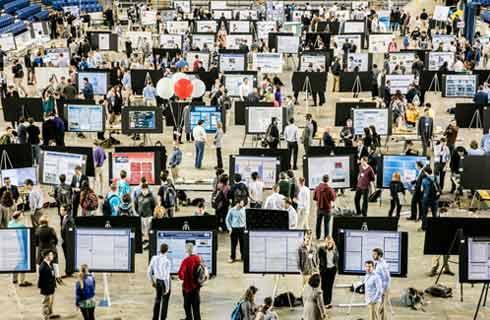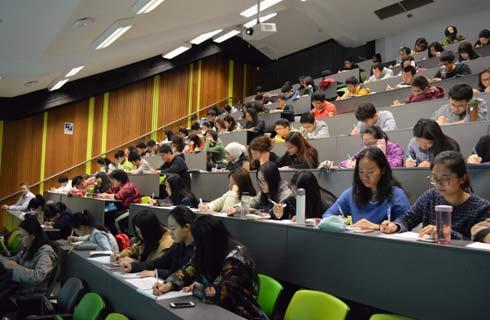Bachelor of Arts in Astronomy

学历文凭
Bachelor Degree

专业院系
天文学

开学时间

课程时长

课程学费

国际学生入学条件
High School Transcripts.
Typically, the most important factor in the admission evaluation process is demonstrated academic achievement in a challenging secondary school program.
The admission committee looks for applicants who have completed the most rigorous academic courses available in their secondary schools and recommends that prospective students should exceed minimum high school graduation requirements. We require an official transcript. The secondary program should include no fewer than 16 academic courses and must include the following courses:
English 4 units
Mathematics 4 units
Foreign Language 2 units
Science (from among biology, chemistry, and physics) 2 units (*)
Social Studies 1 unit
A TOEFL or IELTS score should not be more than two years old. Depending on the school, most admitted graduate students attain a minimum total score of 90 on the internet-based (iBT) TOEFL (including sectional minimums of 22 in speaking, 22 in writing, 23 in reading and 23 in listening). The minimum paper-based TOEFL score requirement is usually 600, and the minimum IELTS score requirement is 7.0.
IDP—雅思考试联合主办方

雅思考试总分
7.0
了解更多
- 雅思总分:7
- 托福网考总分:90
- 托福笔试总分:600
- 其他语言考试:NA
CRICOS代码:
申请截止日期:请 与IDP联系 以获取详细信息。
课程简介
Although the study of astronomy has ancient roots, it is now one of the most rapidly developing and exciting subjects in modern science. Astronomy is the study of the Universe and its contents: planets, stars, black holes, galaxies, and quasars. Each of these is a fascinating topic in its own right, but perhaps the greatest achievement of modern astronomy has been to gather them all into a rich and coherent picture, one which depicts the origin and evolution of all things from the Big Bang to the development of living organisms. Recent advances in astronomy have derived from new technologies that have yielded instruments of unprecedented power: telescopes with 10-meter mirrors, orbiting satellite observatories for all parts of the electromagnetic spectrum, deep space missions to sample planetary atmospheres and surfaces, and huge laboratories for detection of elusive cosmic neutrinos and gravity waves. The excitement and accessibility of astronomy are featured in frequent press coverage of major new discoveries, including in recent years the discovery of planets orbiting other stars, a comet crashing into Jupiter, the discovery of very young galaxies in the distant universe, the detection of gravitational waves from merging black holes, the possibility of life on Mars, the threat of asteroid collisions with the Earth, and the detection of primordial ripples in the cosmic background radiation. Astronomy draws from, and contributes to, many other subjects: primarily physics but also geology, atmospheric and environmental science, biology, and even philosophy. The coursework of the two Astronomy majors offers students the opportunity to explore these frontier discoveries while simultaneously developing fundamental analytical and quantitative skills useful in many different careers. A total of 35 Astronomy courses are open to majors. The Astronomy major (BA) offers a concentration on science in the context of a liberal arts degree for students who do not intend to pursue graduate training in astronomy or physics. It is often part of a double major. The Astronomy-Physics major (BS) provides more rigorous preparation for graduate work in astronomy, physics, computer science, or related fields.
相关申请

预科

奖学金

实习机会

在校学习

跨境学习

校园授课-线上开始

在线/远程学习
学校排名
世界排名
107
数据源:泰晤士高等教育世界大学排名
关于弗吉尼亚大学

弗吉尼亚大学是全美国最知名公立大学之一当200多年前,美国第三任总统托马斯.杰佛逊创办UVA时,他的心愿是将学校办成一所国家级的公立大学。如今他的愿望已然实现,根据US News的排名,UVA是两所全美最好的公立大学之一。24000名学生正在12个学院追逐他们的学术梦想。UVA要求文理学院和商学院的学生在毕业之前掌握一门外语,文理学院的学生还必须参加英语写作、人文和艺术、社会科学、自然科学和数学、非西方研究和作文的课程。非常有能力的学生可以得到Echols Scholars项目的录取,这个项目给予200名顶尖的新生机会去寻求学术探索,而不需要受专业领域要求限制。
本校相关课程
Doctor of Juridical Science

学历文凭
Ph.D.
下一个开始日期
课程费用总额
Juris Doctor

学历文凭
Juris Doctor
下一个开始日期
课程费用总额
Juris Doctor/Master of Arts in Philosophy

学历文凭
Combined Graduate / Doctoral Degree
下一个开始日期
课程费用总额
Juris Doctor/Master of Arts in History

学历文凭
Combined Graduate / Doctoral Degree
下一个开始日期
课程费用总额
Juris Doctor/Master of Arts in Government

学历文凭
Combined Graduate / Doctoral Degree
下一个开始日期
课程费用总额
Juris Doctor/Master of Arts in English

学历文凭
Combined Graduate / Doctoral Degree
下一个开始日期
课程费用总额
其他相关课程
天文学学士学位

纽约州立大学新帕尔兹分校
泰晤士高等教育世界大学排名:

学历文凭
Bachelor Degree
下一个开始日期
课程费用总额
Bachelor of Science in Astronomy

乔治梅森大学-INTO USA
泰晤士高等教育世界大学排名:

学历文凭
Bachelor Degree
下一个开始日期
课程费用总额
天文学理学硕士

圣玛丽大学
泰晤士高等教育世界大学排名:

学历文凭
Masters Degree
下一个开始日期
课程费用总额
Master of Science in Astronomy (Non-Thesis Track)

内华达大学拉斯维加斯分校
泰晤士高等教育世界大学排名:776

学历文凭
Masters Degree
下一个开始日期
课程费用总额
天文学硕士

波士顿大学
泰晤士高等教育世界大学排名:76

学历文凭
Masters Degree
下一个开始日期
课程费用总额
Doctor of Philosophy in Physics and Astronomy

普渡大学
泰晤士高等教育世界大学排名:

学历文凭
Ph.D.
下一个开始日期
课程费用总额



